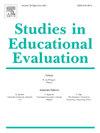网络高等教育中同伴反馈建模需要进行探索性研究
IF 2.6
2区 教育学
Q1 EDUCATION & EDUCATIONAL RESEARCH
引用次数: 0
摘要
同伴反馈(PFB)被认为是支持学习和互动的一种可靠和有益的方法。然而,PFB是一项复杂的技能,需要通过建模进行明确的指导。为了充分发挥其积极作用,一种以理论和教学法为导向的PFB应用——即支架式PFB建模——被整合到在线高等教育学术写作课程中。为了解决本课程中对PFB的需求驱动的修改,学生在课程结束后进行了调查,以提供他们对PFB的额外支持需求的见解。总共有173名学生回答了反思性问题,6名学生接受了采访。使用Atlas.ti分析他们的反应。分析表明,在观测和仿真阶段尤其需要建立PFB模型。学生指出需要举例、额外的(循序渐进的)教学材料、指导练习的机会和额外的教师反馈。此外,学生们还提出了改进PFB流程的建议;这些建议大多与课程的在线方面及其对互动可能性的负面影响有关,这阻碍了学生之间的沟通和信任和关系的发展。这些结果表明,在在线高等教育课程中,教学驱动的PFB应用需要需求驱动的、基于上下文的PFB作业重新设计,特别是在观察和仿真建模阶段,特别注意交互。本文章由计算机程序翻译,如有差异,请以英文原文为准。
Peer feedback modelling needs in online higher education an exploratory study
Peer feedback (PFB) is considered a reliable and beneficial method for supporting learning and interaction. However, PFB is a complex skill that needs explicit instruction through modelling. To leverage the positive effects, a theoretical and pedagogy-driven application of PFB - namely scaffolded PFB modelling - was integrated into an online higher education academic writing course. To address needs-driven modifications of PFB within this course, students were surveyed after course completion to provide insights into their additional supporting needs about PFB. In total, 173 students answered reflective questions and six students were interviewed. Their responses were analyzed using Atlas.ti. Analyses showed that the need for PFB modelling was especially shown in the phases of observation and emulation. Students indicated the need for examples, additional (step-by-step) instructional materials, and the opportunity for guided practice and additional teacher feedback. In addition, students also provided suggestions to improve the PFB process; most of these suggestions were related to the online aspect of the course and its negative influence on interaction possibilities, which impeded communication and the development of trust and relationships among students. These results demonstrate that a pedagogy-driven application of PFB in an online higher education course requires a needs-driven, context-dependent redesign of PFB assignment(s), especially in the observation- and emulation modelling phases with extra attention to interaction.
求助全文
通过发布文献求助,成功后即可免费获取论文全文。
去求助
来源期刊

Studies in Educational Evaluation
Multiple-
CiteScore
6.90
自引率
6.50%
发文量
90
审稿时长
62 days
期刊介绍:
Studies in Educational Evaluation publishes original reports of evaluation studies. Four types of articles are published by the journal: (a) Empirical evaluation studies representing evaluation practice in educational systems around the world; (b) Theoretical reflections and empirical studies related to issues involved in the evaluation of educational programs, educational institutions, educational personnel and student assessment; (c) Articles summarizing the state-of-the-art concerning specific topics in evaluation in general or in a particular country or group of countries; (d) Book reviews and brief abstracts of evaluation studies.
 求助内容:
求助内容: 应助结果提醒方式:
应助结果提醒方式:


